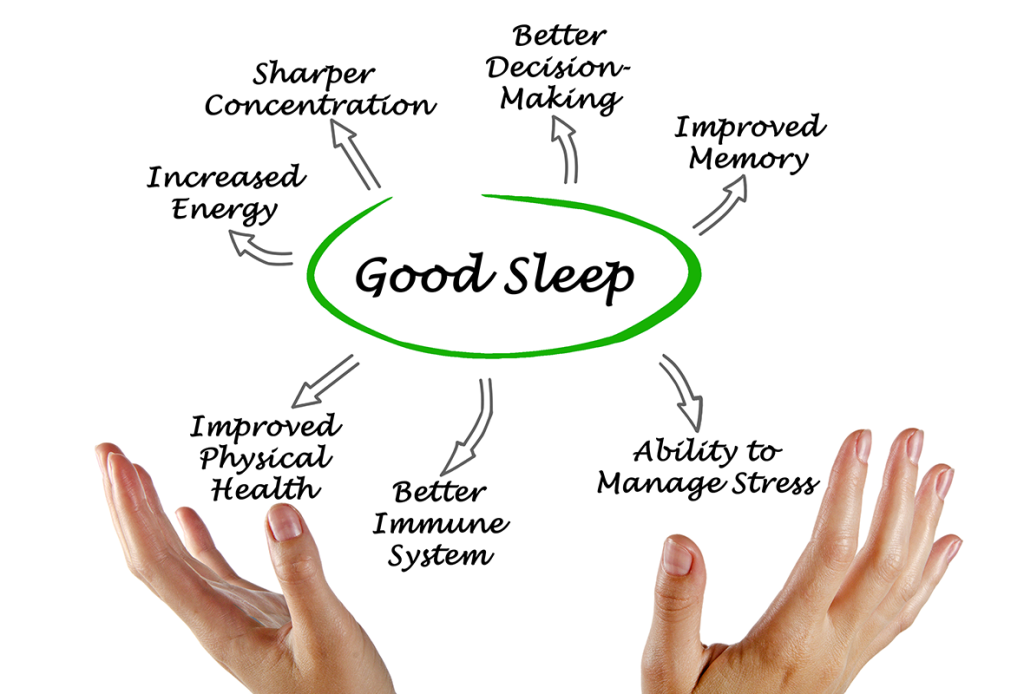Table of Contents
Sleep is an essential component of our daily lives, playing a crucial role in maintaining our physical, mental, and emotional well-being. Despite its importance, many people struggle to get adequate, restful sleep due to busy lifestyles, stress, and various environmental factors. Understanding the significance of sleep and adopting effective strategies to enhance sleep quality can lead to improved overall health and a better quality of life.
Why Sleep is Important
Sleep is not merely a period of rest; it is a dynamic process that supports numerous physiological functions. Here are some key reasons why sleep is vital:
1. Physical Health
During sleep, the body undergoes various repair and maintenance processes. Growth hormone is released, aiding in tissue repair and muscle growth. Sleep also plays a role in maintaining a healthy immune system, as it allows the body to produce cytokines, which fight infection and inflammation.

2. Mental Health
Sleep is essential for cognitive function and emotional regulation. It enhances learning, memory consolidation, and problem-solving skills. Lack of sleep can lead to impaired judgment, decreased concentration, and increased risk of mental health disorders such as anxiety and depression.
3. Metabolic Health
Sleep influences metabolic processes, including appetite regulation and insulin sensitivity. Poor sleep can disrupt these processes, leading to weight gain and an increased risk of metabolic disorders such as type 2 diabetes and obesity.
4. Cardiovascular Health
Adequate sleep is linked to heart health. It helps regulate blood pressure and reduces the risk of cardiovascular diseases such as hypertension, heart attack, and stroke.
Tips for Improving Sleep Quality
Improving sleep quality involves creating a conducive sleep environment, adopting healthy sleep habits, and managing stress. Here are some practical tips to help you achieve better sleep:

1. Establish a Consistent Sleep Schedule
Going to bed and waking up at the same time every day helps regulate your body’s internal clock, known as the circadian rhythm. Consistency reinforces your sleep-wake cycle, making it easier to fall asleep and wake up naturally.
2. Create a Relaxing Bedtime Routine
Develop a pre-sleep routine that signals your body it’s time to wind down. Engage in relaxing activities such as reading, taking a warm bath, or practicing gentle yoga. Avoid stimulating activities like watching TV, using electronic devices, or engaging in intense exercise close to bedtime.
3. Optimize Your Sleep Environment
Your sleep environment plays a significant role in sleep quality. Ensure your bedroom is conducive to sleep by:
- Keeping it cool: A slightly cool room temperature (around 65°F or 18°C) is ideal for sleep.
- Reducing noise: Use earplugs, a white noise machine, or a fan to block out disruptive sounds.
- Minimizing light: Use blackout curtains or an eye mask to create a dark sleep environment.
- Choosing a comfortable mattress and pillows: Invest in a mattress and pillows that support your preferred sleep position and provide adequate comfort.
4. Limit Exposure to Blue Light
Blue light from electronic devices such as smartphones, tablets, and computers can interfere with the production of melatonin, the hormone that regulates sleep. To minimize blue light exposure:
- Use blue light filters: Many devices have settings or apps that reduce blue light emission.
- Turn off devices: Aim to turn off electronic devices at least an hour before bedtime.
- Engage in screen-free activities: Read a physical book, listen to soothing music, or practice meditation.

5. Be Mindful of Your Diet and Hydration
What you eat and drink can affect your sleep. To promote better sleep:
- Avoid caffeine and nicotine: These stimulants can interfere with your ability to fall asleep and stay asleep. Limit consumption, especially in the afternoon and evening.
- Limit alcohol intake: While alcohol may initially make you feel drowsy, it can disrupt sleep later in the night. Drink in moderation and avoid alcohol close to bedtime.
- Be mindful of heavy meals: Eating large, heavy meals before bed can cause discomfort and disrupt sleep. Opt for light snacks if you’re hungry in the evening.
- Stay hydrated: Drink enough water throughout the day, but avoid excessive fluid intake close to bedtime to minimize nighttime trips to the bathroom.
6. Manage Stress and Anxiety
Stress and anxiety are common culprits of sleep disturbances. Incorporating stress-reducing techniques into your daily routine can improve sleep quality:
- Practice mindfulness and meditation: Mindfulness practices and meditation can help calm the mind and promote relaxation.
- Engage in regular physical activity: Exercise can reduce stress and improve sleep quality, but try to finish intense workouts at least a few hours before bed.
- Write in a journal: Writing down your thoughts and worries before bed can help clear your mind and prevent rumination.
7. Seek Professional Help if Needed
If you’ve tried various strategies and still struggle with sleep, it may be time to seek professional help. Sleep disorders such as insomnia, sleep apnea, and restless legs syndrome require medical attention. Consult a healthcare provider or a sleep specialist for a thorough evaluation and appropriate treatment.
Conclusion
Sleep is a cornerstone of good health, influencing physical, mental, and emotional well-being. By prioritizing sleep and adopting healthy sleep habits, you can improve your sleep quality and overall health. Remember, achieving better sleep is a gradual process that requires consistency and patience. With the right strategies, you can create a sleep-friendly environment and enjoy the restorative benefits of a good night’s sleep.


